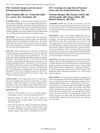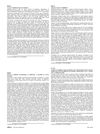 9 citations,
January 2016 in “Skin Pharmacology and Physiology”
9 citations,
January 2016 in “Skin Pharmacology and Physiology” The study concluded that both estrogen and androgen receptors, which decrease with age, are linked to skin aging and may be hormonally regulated.
 2 citations,
January 2019 in “Springer eBooks”
2 citations,
January 2019 in “Springer eBooks” The conclusion is that different blood diseases cause specific oral symptoms and require varied treatments to manage these symptoms and improve patient health.
 1 citations,
May 2017 in “InTech eBooks”
1 citations,
May 2017 in “InTech eBooks” Hair loss in Androgenetic alopecia (AGA) is due to altered cell sensitivity to hormones, not increased hormone levels. Hair growth periods shorten over time, causing hair to become thinner and shorter. This is linked to miscommunication between cell pathways in hair follicles. There's also a change in gene expression related to blood vessels and cell growth in balding hair follicles. The exact molecular causes of AGA are still unclear.
 April 2003 in “Experimental Dermatology”
April 2003 in “Experimental Dermatology” The workshop highlighted the genetic links and psychological impacts of hair loss and skin disorders.
 115 citations,
August 2008 in “The Journal of Clinical Endocrinology & Metabolism”
115 citations,
August 2008 in “The Journal of Clinical Endocrinology & Metabolism” Thyroid hormones help hair grow, reduce hair loss, and increase hair pigment.
 102 citations,
April 2014 in “International Journal of Dermatology”
102 citations,
April 2014 in “International Journal of Dermatology” The treatment helped reduce symptoms and stabilize the hairline in most patients with Frontal Fibrosing Alopecia, but hair regrowth was limited.
 26 citations,
December 2016 in “Psychiatric Clinics of North America”
26 citations,
December 2016 in “Psychiatric Clinics of North America” Testosterone therapy and surgeries like mastectomy improve transgender men's lives and mental health with low risks and high satisfaction.
 8 citations,
February 2020 in “Aesthetic Surgery Journal”
8 citations,
February 2020 in “Aesthetic Surgery Journal” Adding cells to fat grafts improves hair regrowth in early baldness, but effects lessen over time.
 2 citations,
November 2017 in “PloS one”
2 citations,
November 2017 in “PloS one” Some vitamin D analogs can thicken skin and reduce pore size like a common acne treatment, with one analog also affecting skin growth factors.
 February 2024 in “International neuropsychiatric disease journal”
February 2024 in “International neuropsychiatric disease journal” Alopecia areata severely impacts quality of life, mental health, and work productivity.
 July 2023 in “The Egyptian Journal of Hospital Medicine ”
July 2023 in “The Egyptian Journal of Hospital Medicine ” Alopecia areata is a hair loss condition caused by immune factors and can be treated with JAK inhibitors.
 April 2023 in “Tikrit journal of pharmaceutical sciences”
April 2023 in “Tikrit journal of pharmaceutical sciences” Ginger extract helps hair growth and reduces the need for prednisolone in alopecia areata patients.
 February 2024 in “International journal of health, medicine and nursing practice”
February 2024 in “International journal of health, medicine and nursing practice” Raising awareness about PCOS can improve women's quality of life.
 October 2023 in “bioRxiv (Cold Spring Harbor Laboratory)”
October 2023 in “bioRxiv (Cold Spring Harbor Laboratory)” A protein called EGFR protects hair follicle stem cells, and when it's disrupted, hair follicles can be damaged, but blocking certain pathways can restore hair growth.
 September 2006 in “Plastic and Reconstructive Surgery”
September 2006 in “Plastic and Reconstructive Surgery” The SGAP flap effectively treats large sacral pressure sores with good results and minimal complications.
 September 2006 in “Plastic and Reconstructive Surgery”
September 2006 in “Plastic and Reconstructive Surgery” Hair transplant surgeries can be improved by preserving follicles in a special solution, and surgeries done at outpatient facilities are more profitable than those at hospitals.
 34 citations,
July 1987 in “The Journal of dermatologic surgery and oncology”
34 citations,
July 1987 in “The Journal of dermatologic surgery and oncology” Improved dermabrasion techniques in 1987 led to better treatment results for skin issues like acne scars.
 7 citations,
April 2023 in “Frontiers in immunology”
7 citations,
April 2023 in “Frontiers in immunology” Oral baricitinib and ruxolitinib are effective and safe for treating alopecia areata.
 2 citations,
September 2023 in “Scientific reports”
2 citations,
September 2023 in “Scientific reports” The nanocomposite films with vitamins and nanoparticles are promising for fast and effective burn wound healing.
 1 citations,
March 2018 in “bioRxiv (Cold Spring Harbor Laboratory)”
1 citations,
March 2018 in “bioRxiv (Cold Spring Harbor Laboratory)” The hair treatment made hair grow faster and thicker and strengthened the hair roots.
 May 2023 in “Sučasna pedìatrìâ. Ukraïna”
May 2023 in “Sučasna pedìatrìâ. Ukraïna” An 11-year-old child with total hair loss may have a genetic autoimmune disease, and the outlook for hair regrowth is not good.
 40 citations,
February 2012 in “Dermatology Online Journal”
40 citations,
February 2012 in “Dermatology Online Journal” Lasers might help hair growth in some alopecia cases, but more research is needed to confirm their effectiveness and safety.
 7 citations,
July 2019 in “International archives of internal medicine”
7 citations,
July 2019 in “International archives of internal medicine” Common skin conditions can greatly affect a person's mental health and social life.
 March 2014 in “Journal of the American Academy of Dermatology”
March 2014 in “Journal of the American Academy of Dermatology” Alopecia areata is relatively common in children, has a variable course, and shows different responses to treatment; thyroid testing is recommended for those affected.
 January 2003 in “Elsevier eBooks”
January 2003 in “Elsevier eBooks” Androgens and other hormones affect hair growth and skin conditions like acne.
 April 2024 in “International Journal of Research Publication and Reviews”
April 2024 in “International Journal of Research Publication and Reviews” Alopecia areata causes hair loss with varied treatment responses and frequent relapses.
 19 citations,
October 2017 in “European Journal of Pharmaceutics and Biopharmaceutics”
19 citations,
October 2017 in “European Journal of Pharmaceutics and Biopharmaceutics” The gel made of minoxidil and hydroxypropyl-β-cyclodextrin improves hair growth and is good for long-term use.
 3 citations,
September 1989 in “Journal of Investigative Dermatology”
3 citations,
September 1989 in “Journal of Investigative Dermatology” Methyl caprate greatly increases drug absorption through the skin and is better than other enhancers.
 1 citations,
November 2011 in “Archives of Dermatology”
1 citations,
November 2011 in “Archives of Dermatology” A woman's hair loss was caused by her husband's testosterone gel and a diabetic man's nail disease led to bone infection, both treated successfully.
 1 citations,
July 2018 in “Elsevier eBooks”
1 citations,
July 2018 in “Elsevier eBooks” Alopecia Areata is an autoimmune hair loss condition, with various treatments showing mixed effectiveness and no guaranteed cure.





























